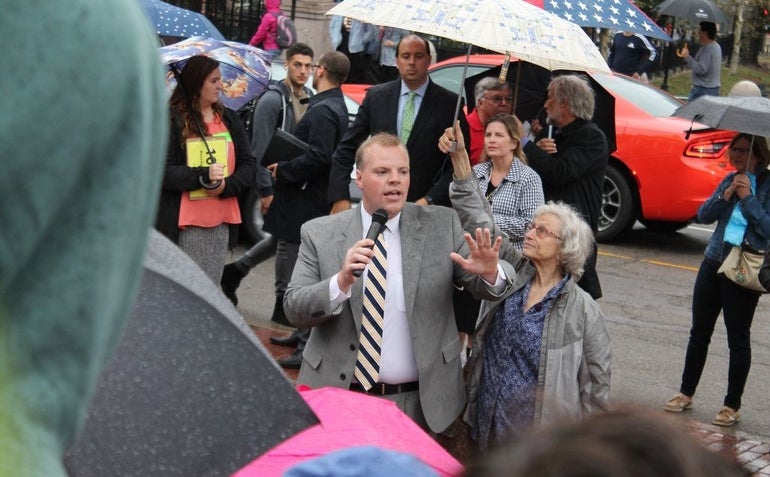Nearly two-thirds of electricity in Massachusetts comes from natural gas, a dynamic that environmental groups and clean energy advocates said Tuesday must change soon.
The Telecommunications, Utilities and Energy Committee heard testimony on bills filed by Sen. Jamie Eldridge (S 1849) and Reps. Sean Garballey and Marjorie Decker (H 3395) calling for the state to get 100 percent of its electricity from renewable sources by 2035. By 2050, the state would need to get all of its energy — including for electricity, heating and transportation — from renewable sources, according to the game-changing energy bills.
At a rally before the hearing, Garballey called the transition to renewable energy the “most important moral issue of our time.” The Arlington Democrat said states must act because the federal government will not, pointing to recent devastating hurricanes in Florida and Texas and wildfires in the western portion of the country as consequences of inaction.
“This kind of dangerous weather activity is directly linked to climate change, and this administration doesn’t get it and ignores it,” he said.
Decker said she and Garballey filed their bill believing it was an “important tool to really educate and have a powerful conversation” and could lead to incremental progress. She told the committee she now believes the state must act because there is “zero leadership” at the federal level, and said the effects of natural disasters and climate change could be “mitigated” through public policy.
“Children and families who are already economically vulnerable and now politically vulnerable, they will continue to receive the worst impacts of this, and the impacts of this, we will lose generations,” Decker, a Cambridge Democrat, said. “To think that that is an exaggeration is, I think, to not fully appreciate the challenges and the difficulties of so many people who are marginalized and vulnerable.”
As supporters of the bills said severe weather and sea-level rise brought on by climate change merits urgent and significant action, representatives of utilities and the petroleum industry pointed to the major role natural gas plays in the state’s energy mix.
According to the U.S. Energy Information Administration, Massachusetts generated 66 percent of its electricity from natural gas in 2016, and in 2015, 27 percent of households used fuel oil as their primary home heating source.
Steve Dodge, the executive director of the Massachusetts Petroleum Council, said in his testimony to the committee that the state “cannot cut the cord completely” on fossil fuel use even as it pursues renewable energy technology, citing “heavy demands on oil and natural gas use for electricity generation, transportation and industrial and commercial use.”
“When you ramp up renewables, you also need natural gas as backup, and I fear that this push to not only eliminate all fossil fuels but to prevent additional fossil fuel infrastructure is going to create a problem when it comes to reliability,” he told the News Service.
Eversource’s Mark Reed drew hisses from the crowd packed into the hearing room when he said his company believes gas pipeline capacity “still needs to be addressed to ensure energy security, reduce carbon, lower customer costs and support the development of renewable energy.”
“Gas will facilitate the transition to clean, affordable energy while providing a backstop for intermittent solar and offshore wind,” he said.
Sen. Marc Pacheco, who serves on the committee, said in response that he hoped utilities “get the fact that we have to move forward if we are going to continue the economic development” fostered by renewable energy while also lowering greenhouse gas emissions.
“We cannot afford to wait any longer to move forward with the transition,” Pacheco said. “To do so would literally place people’s lives in danger, and I think it’s important that the industry you represent and everyone else who comes in relative to utilities get that now.”
In a letter to lawmakers, a group of 30 professors, researchers and other academics focusing on clean energy described the goal of 100 percent clean energy as one that would be “achievable” with “continued innovation” and support from state leaders.
Bob Massie, a longtime environmental advocate and Democratic candidate for governor, said moving to fully renewable energy could save Massachusetts about $18 billion a year that is currently spent importing fossil fuels.
“We have a choice to seize the greatest economic opportunity in the entire history of Massachusetts, bigger than mills or high-tech or fishing or education,” Massie said. “We could move aggressively to build offshore wind and connect that to the grid, and if we don’t do that soon, by pushing the renewable portfolio standard and other elements that favor wind, we could see others lock up specialized ships that one must have to anchor windmills in the ocean floor, or we will have to get in line behind other states who have captured the manufacturing edge that we ignored.”

